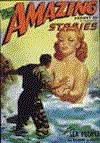|
|
|
'Star Trek: Insurrection' sets phasers on 'lame' December 17, 1998 By Franklin Harris I don't believe in curses, but the ninth "Star Trek" film carries on the series' tradition of sub-par odd-numbered installments. "Star Trek: Insurrection," the third film to feature the "Next Generation" cast, is, like the other lesser Trek efforts, more like a two-episode television story than a movie. And, as a television episode, "Insurrection" would rank below standouts like "Best of Both Worlds," "Yesterday's Enterprise" and "All Good Things." As usual, the acting is fine. Patrick Stewart is, appropriately, commanding as Capt. Jean-Luc Picard. The guest cast, led by F. Murray Abraham as the villainous Ru'afo and Donna Murphy as Picard's love interest, Anij, is equally good. And the regulars all wear their characters well -- on those rare occasions when they are given anything to do. The problem with "Insurrection" is that it is -- simply put -- lame. The plot revolves around a planet that, because of its being constantly bathed by "metaphasic" radiation, is a virtual fountain of youth. The planet's 600 inhabitants -- members of a colony that has forsaken technology -- not only haven't aged in 300 years, they've grown younger. Of course, once the planet's secret is out, it's inevitable that someone is going to come looking for eternal life. That someone is Ru'afo, whose people have formed an alliance with corrupt elements within the United Federation of Planets. Naturally, of course, Picard and company discover the insidious plot their own government is backing and set out to end it, hence the title, "Insurrection." I won't bother to spoil any more of the film's plot, even though it doesn't take Spock's brain to figure out, after only the first 30 minutes, every hackneyed "twist" the story will take. The idea behind the film isn't a bad one. The idea of immortality (or mortality) has been approached in Trek before, sometimes with stellar results, as in "Star Trek II: The Wrath of Khan." It's the execution that is bad. The hard questions aren't asked. That the planet is a paradise is taken for granted. But what about overpopulation? The people on the planet are immortal and still having children. In the long run, things could get rather crowded. If the people on the planet are growing younger, won't they eventually regress to babies? Why do the colony's children not experience the radiation's effects until they grow to adulthood, even as the "Enterprise" crew experiences the effects after only a few hours? And, come to think of it, why fight the colonists at all? There are only 600 of them on the entire planet. There should be plenty of room to build resorts and spas for the galaxy's ailing. Resort stations could even be built in orbit, as the radiation's effects are shown to be potent there as well. When the plot holes are addressed at all, they are papered over with Trek's now ubiquitous (and infamous) technobabble. The virtue of immortality itself isn't even questioned, which is rather odd seeing as how Picard questioned it two movies ago, in "Star Trek: Generations." I'd at least give screenwriters Rick Berman and Michael Piller credit for upholding the sovereign rights of the colonists in the face of ruthless pragmatism if it weren't for the fact that the ruthless pragmatists are the Federation. Berman and Piller have, on repeated occasions, shown utter contempt for Gene Roddenberry's ideal society. That the Federation is aligned against a non-technological culture flies against Roddenberry's pro-technology, pro-science vision. Sure, the Federation, as depicted in the original television series and the first few seasons of "The Next Generation" is too close to perfect. But it was meant to be. If Trek's current producers have no use for Roddenberry's ideals, there are other worlds in which they can play. Besides, we're all getting tired of every Starfleet admiral turning out to be corrupt, a homicidal maniac or both. Doesn't Starfleet have psychiatric evaluations? At Stewart's request, efforts were made to make "Insurrection" a lighter film than the last two. Unfortunately, "lighter" has translated into forced -- and even sometimes bawdy -- attempts at humor. Sometimes it descends to the level of "Star Trek V: The Final Frontier," which gave us Kirk, Spock and McCoy singing around a campfire and Scotty bumping his head on bulkheads. "Insurrection" gives us Picard and Data singing Gilbert and Sullivan (during a chase sequence!) and Worf getting acne. Even some of the special effects sequences are surprisingly bad. And, yet, as disappointing as it was, "Star Trek: Insurrection" was better than I thought it would be. It just goes to show how, in the age of "Star Trek: Voyager," we've been forced to accept diminished expectations. At least "Voyager" has Jeri Ryan. |

RECENT COLUMNS
Order a helping of Cartoon Network's 'Robot Chicken'
03/31/05
Campaign against video games is political grandstanding
03/24/05
Prize-winning author is 'Wrong About Japan'
03/17/05
Censored book not a good start
03/10/05
Some superhero comics are for 'fanboys' only
03/03/05
'Constantine' does well with its out-of-place hero
02/24/05
'80s publisher First Comics' legacy still felt
02/17/05
Director's cut gives new 'Daredevil' DVD an edge
02/10/05
Put the fun back into 'funnybooks'
02/04/05
Is 'Elektra' the end of the road for Marvel movies?
01/27/05
'House of Flying Daggers' combines martial arts and heart
01/20/05
Anniversary edition of 'Flying Guillotine' has the chops
01/13/05
Movie books still have role in the Internet era
01/06/05
Looking ahead to the good and the bad for 2005
12/30/04
The best and worst of 2004
12/23/04
'Has-been' Shatner is a 'transformed man'
12/16/04
© Copyright 2005 PULP CULTURE PRODUCTIONS
Web site designed by Franklin Harris.
Send feedback to franklin@pulpculture.net.